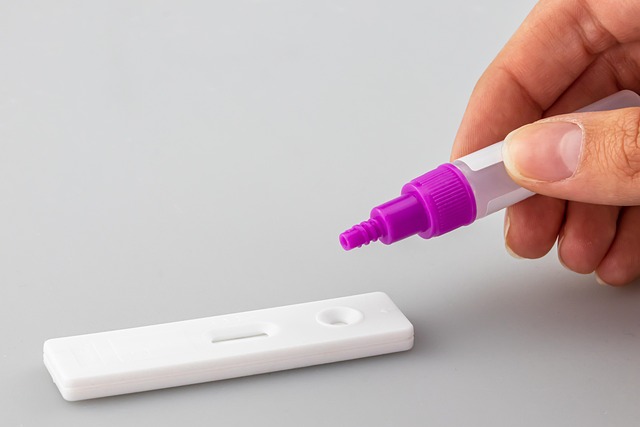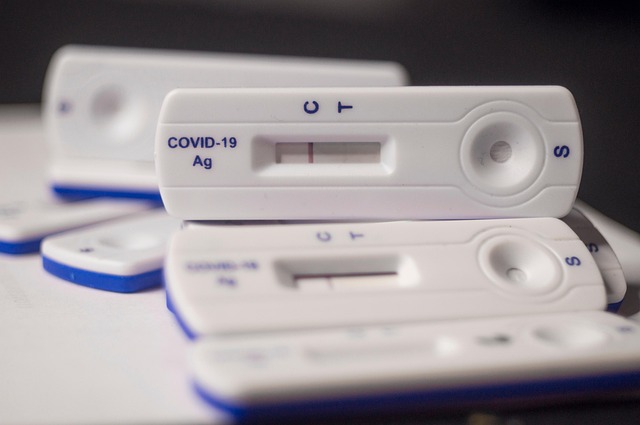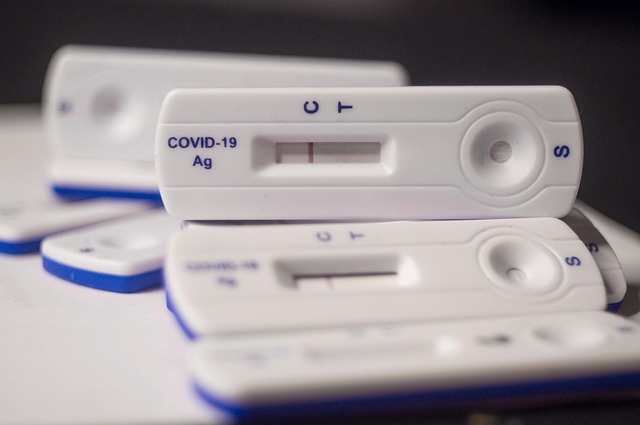Comprehensive thyroid testing goes beyond basic TSH to evaluate T3, T4 hormones and TPO/Tg antibodies for early detection of hypothyroidism, hyperthyroidism, and autoimmune disorders. Regular screening is crucial for all ages as childhood thyroid issues can persist. Advanced techniques offer an intricate view of thyroid function, enabling early identification and interventions to reduce hormone replacement therapy side effects. In the digital age, affordable testing packages empower individuals to take control of their metabolic function through comprehensive thyroid testing. Interpreting test results with a healthcare professional ensures personalized treatment and optimal thyroid health.
“Uncover the power of affordable comprehensive thyroid screening – a crucial step towards optimal health. This guide explores the significance of thyroid function, shedding light on common disorders like hypothyroidism and hyperthyroidism. We delve into traditional vs. advanced screening methods, highlighting the benefits of modern technology in early detection. Discover budget-friendly testing packages, empowering you to take charge of your well-being. Learn how to interpret results and take the next steps towards a healthier thyroid.”
- Understanding Thyroid Function and Its Importance
- Common Thyroid Disorders and Their Symptoms
- Traditional vs. Advanced Screening Methods
- Affordable Comprehensive Testing Packages
- Interpreting Results and Next Steps
Understanding Thyroid Function and Its Importance

Thyroid function is essential for maintaining overall health and well-being. This small gland, located at the base of your neck, plays a pivotal role in regulating metabolism by producing hormones that influence nearly every cell in your body. A comprehensive thyroid screening involves assessing these hormone levels to ensure they’re within a healthy range. Understanding thyroid function is crucial because even subtle imbalances can lead to various symptoms and long-term health issues.
Comprehensive thyroid testing goes beyond basic TSH (thyroid-stimulating hormone) levels, delving into measurements of T3 and T4 hormones, as well as TPO and Tg antibodies. Such detailed evaluation allows for the early detection of thyroid disorders like hypothyroidism, hyperthyroidism, or autoimmune conditions like Hashimoto’s thyroiditis. Knowing when to get a thyroid checkup—whether due to symptoms like fatigue, weight changes, or mood swings—is essential. Even childhood thyroid disorders can have long-lasting effects, so regular screening is vital for all age groups. Additionally, for individuals concerned about hormone levels, including testosterone, comprehensive thyroid testing can provide valuable insights into overall hormonal health.
Common Thyroid Disorders and Their Symptoms

The thyroid gland, located at the base of the neck, plays a pivotal role in regulating metabolism. Disorders of this small but powerful gland are surprisingly common, affecting millions worldwide. Understanding these conditions is crucial for prompt diagnosis and effective management. Two primary types include hypothyroidism and hyperthyroidism. Hypothyroidism occurs when the thyroid doesn’t produce enough hormones, leading to symptoms such as fatigue, weight gain, dry skin, and constipation. On the contrary, hyperthyroidism results from an overactive thyroid, causing increased energy levels, rapid heartbeat, weight loss, and nervousness.
Comprehensive thyroid testing is essential for accurate diagnosis. These tests typically include measurements of thyroid-stimulating hormone (TSH), thyroxine (T4), and triiodothyronine (T3) levels in the blood. Such screening is particularly relevant for pregnant women, as proper thyroid function is vital for baby’s thyroid development. Moreover, considering that symptoms may not always be evident, regular thyroid checks are recommended for individuals over a certain age or with risk factors, answering the question: when should I get a thyroid checkup? Early detection through comprehensive thyroid testing enables healthcare professionals to initiate appropriate treatments, ensuring optimal health outcomes.
Traditional vs. Advanced Screening Methods

In the realm of comprehensive thyroid testing, traditional methods have long been the go-to approach, involving a simple blood test to measure thyroid-stimulating hormone (TSH) levels. This standard screening option is widely accessible and relatively affordable, serving as an initial step in evaluating thyroid health. However, with advancements in medical technology, a shift towards more advanced screening methods has emerged, offering a deeper endocrine system overview.
These cutting-edge techniques go beyond TSH measurements, delving into a broader spectrum of hormones and biomarkers associated with the thyroid gland. By analyzing multiple markers, such as thyroxine (T4), triiodothyronine (T3), and anti-thyroid antibodies, healthcare professionals can gain a more nuanced understanding of a patient’s thyroid function. This comprehensive approach is especially beneficial for identifying subtle imbalances that might be missed by traditional methods. Moreover, it enables early detection of thyroid disorders, facilitating timely interventions and potentially mitigating the risk of complications, including hormone replacement therapy side effects.
Affordable Comprehensive Testing Packages

In today’s digital era, the importance of comprehensive thyroid testing cannot be overstated, especially when considering optimal hormone levels for women. Affordable comprehensive testing packages offer a convenient and cost-effective way to assess one’s thyroid health. These tests typically include a panel of markers that go beyond basic TSH (Thyroid Stimulating Hormone) levels, providing a more holistic view of the endocrine system overview. By examining various hormones and thyroid markers, healthcare professionals can gain valuable insights into overall metabolic function.
These comprehensive testing options allow individuals to take charge of their health by identifying potential imbalances or anomalies early on. Accurate interpretation of thyroid levels is key in determining if one’s symptoms are related to thyroid dysfunctions. Many reputable labs now offer these affordable packages, making it easier for folks to access information about their thyroid health without breaking the bank.
Interpreting Results and Next Steps

After undergoing comprehensive thyroid testing, interpreting your results is a crucial step. A high TSH level, for instance, may indicate hypothyroidism, while low TSH could suggest hyperthyroidism. Different thyroid scans types like ultrasound or radioactive iodine scans can provide additional insights into your gland’s function and structure. Understanding these results is the first step towards informed decision-making.
Based on the findings, consulting with a healthcare professional becomes paramount. They can guide you on whether further testing is necessary, recommend personalized treatment options, and explain the importance of follow-up care. Proper preparation for future thyroid testing, including any required fasts or specific medications to stop before the test, will ensure accurate results and continue your journey towards optimal thyroid health.
Comprehensive thyroid testing is no longer a luxury but an accessible, affordable option for many. With advanced screening methods available at competitive prices, individuals can now take control of their health by understanding their thyroid function and managing any potential disorders early on. By choosing the right testing packages, people can navigate this essential aspect of wellness without breaking the bank. Remember, knowledge is power when it comes to your thyroid health, so why not dive into these options and make informed decisions?
